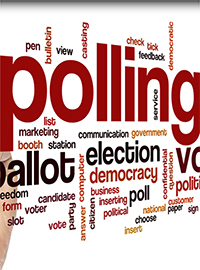| Democratic Pollsters Acknowledge: We Darn Near Lost |
 |
|
By Byron York
Wednesday, April 14 2021 |
Just six months ago – it seems like so much longer – many Democrats were supremely confident about their prospects in the 2020 election. Some saw Joe Biden winning in a landslide over then-President Donald Trump. Speaker Nancy Pelosi believed House Democrats would increase the size of their majority. Others predicted Democrats flipping the Senate with a clear majority. Yes, they won, but it didn't happen as predicted. Instead, Democrats barely, barely gained control in Washington, with a narrow victory for the presidency, a loss of seats in the House and a Senate tied 50-50, with a Democratic vice president giving the party the narrowest tie-breaking margin possible. What happened? Now, several Democratic pollsters are admitting they didn't understand what was going on during the campaign and are trying to figure out why. The biggest problem was the presidential race. "Thanks to the quirks of the Electoral College, the difference between a new administration and four more years of Donald Trump was merely 43,000 votes cast across Wisconsin, Georgia and Arizona," the pollsters write. "Every one of us thought Democrats would have a better Election Day than they did." The group – made up of ALG Research, Garin-Hart-Yang Research, GBAO Strategies, Global Strategies Group and Normington Petts, all leading Democratic pollsters – found two types of problems. The first was that they had a seriously skewed picture of voter turnout. "We found our models consistently overestimated Democratic turnout relative to Republican turnout in a specific way," they wrote. "Among low propensity voters – people who we expect to vote rarely – the Republican share of the electorate exceeded expectations at four times the rate of the Democratic share. This turnout error meant, at least in some places, we again underestimated relative turnout among rural and white non-college voters, who are overrepresented among low propensity Republicans." The second mistake the pollsters made was in measuring support for each candidate. The source of that problem could have been "a million different things," they concede, but they believe they missed a Trump surge at the end of the campaign. "Exit polls and callback surveys suggested late-deciding voters broke overwhelmingly for Trump," they write. In addition, Trump repeatedly told his voters the polls were fake news, and that, the pollsters believe, likely led those voters to refuse to talk to pollsters. (To that, many Trump voters would say: Duh!) "Trump may have helped turn this into a problem for pollsters by attracting distrustful voters and making his most ardent supporters even more distrustful of other people, of the media, and perhaps even polling itself," they write. "That, in turn, could have made his supporters less likely to answer polls." Then, of course, there was the issue of media-generated stigma directed at Trump voters that might have led them to keep their presidential preference secret not only from pollsters but everyone else, as well. Add it all up, and the pollsters believe that the voters they counted were not fully representative of the electorate as a whole. And that gave them a rosier picture of Democratic chances in the election than was actually warranted. Remember that all of these pollsters are Democrats. Still, there seems little doubt the problems they encountered also afflicted nonpartisan pollsters as well, including those cited in media reports. The result was that many observers got it wrong again – almost as badly as they got it wrong in 2016. The underlying question: Was it all Trump? Was there something specific about the former president and the voters he attracted that undermined the efficacy of polling? To put it another way, will polls become at least a bit more accurate when Trump is not on the ballot? The pollsters conclude that the inherent problem of polling – predicting who will turn out and how they will vote – were much tougher in the Trump years. "This problem appears to have been amplified when Trump was on the ballot," they write, "and it is these particular voters who Trump activated that did not participate in polls." It seems true that Trump had a particular appeal to some voters that no future candidate will be able to duplicate. But it's also true that polls had problems before Trump, and that problematic polls can be megaphoned by some media outlets that have a clear bias in favor of Democrats. Those problems will not go away in 2024, even if Donald Trump is not in the race. Byron York is chief political correspondent for The Washington Examiner. |
Related Articles : |
























